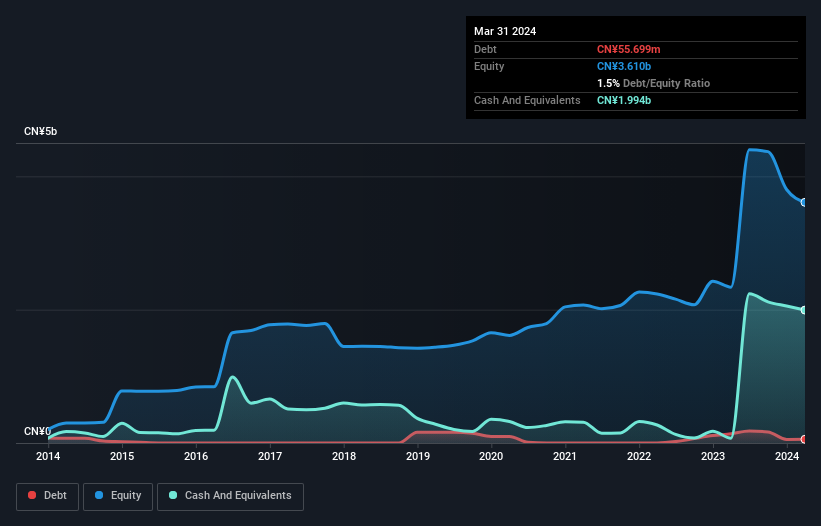Is Beijing Tongtech (SZSE:300379) Weighed On By Its Debt Load?
Legendary fund manager Li Lu (who Charlie Munger backed) once said, 'The biggest investment risk is not the volatility of prices, but whether you will suffer a permanent loss of capital.' So it might be obvious that you need to consider debt, when you think about how risky any given stock is, because too much debt can sink a company. As with many other companies Beijing Tongtech Co., Ltd. (SZSE:300379) makes use of debt. But is this debt a concern to shareholders?
When Is Debt A Problem?
Generally speaking, debt only becomes a real problem when a company can't easily pay it off, either by raising capital or with its own cash flow. Part and parcel of capitalism is the process of 'creative destruction' where failed businesses are mercilessly liquidated by their bankers. However, a more frequent (but still costly) occurrence is where a company must issue shares at bargain-basement prices, permanently diluting shareholders, just to shore up its balance sheet. Of course, the upside of debt is that it often represents cheap capital, especially when it replaces dilution in a company with the ability to reinvest at high rates of return. The first step when considering a company's debt levels is to consider its cash and debt together.
See our latest analysis for Beijing Tongtech
What Is Beijing Tongtech's Net Debt?
As you can see below, Beijing Tongtech had CN¥55.7m of debt at March 2024, down from CN¥138.0m a year prior. But it also has CN¥1.99b in cash to offset that, meaning it has CN¥1.94b net cash.

How Healthy Is Beijing Tongtech's Balance Sheet?
According to the last reported balance sheet, Beijing Tongtech had liabilities of CN¥505.3m due within 12 months, and liabilities of CN¥55.9m due beyond 12 months. Offsetting this, it had CN¥1.99b in cash and CN¥612.5m in receivables that were due within 12 months. So it actually has CN¥2.04b more liquid assets than total liabilities.
This excess liquidity is a great indication that Beijing Tongtech's balance sheet is almost as strong as Fort Knox. On this view, lenders should feel as safe as the beloved of a black-belt karate master. Simply put, the fact that Beijing Tongtech has more cash than debt is arguably a good indication that it can manage its debt safely. There's no doubt that we learn most about debt from the balance sheet. But you can't view debt in total isolation; since Beijing Tongtech will need earnings to service that debt. So if you're keen to discover more about its earnings, it might be worth checking out this graph of its long term earnings trend.
In the last year Beijing Tongtech had a loss before interest and tax, and actually shrunk its revenue by 21%, to CN¥595m. To be frank that doesn't bode well.
So How Risky Is Beijing Tongtech?
Although Beijing Tongtech had an earnings before interest and tax (EBIT) loss over the last twelve months, it generated positive free cash flow of CN¥34m. So although it is loss-making, it doesn't seem to have too much near-term balance sheet risk, keeping in mind the net cash. With mediocre revenue growth in the last year, we're don't find the investment opportunity particularly compelling. When analysing debt levels, the balance sheet is the obvious place to start. However, not all investment risk resides within the balance sheet - far from it. We've identified 2 warning signs with Beijing Tongtech (at least 1 which is a bit unpleasant) , and understanding them should be part of your investment process.
If you're interested in investing in businesses that can grow profits without the burden of debt, then check out this free list of growing businesses that have net cash on the balance sheet.
Valuation is complex, but we're here to simplify it.
Discover if Beijing Tongtech might be undervalued or overvalued with our detailed analysis, featuring fair value estimates, potential risks, dividends, insider trades, and its financial condition.
Access Free AnalysisHave feedback on this article? Concerned about the content? Get in touch with us directly. Alternatively, email editorial-team (at) simplywallst.com.
This article by Simply Wall St is general in nature. We provide commentary based on historical data and analyst forecasts only using an unbiased methodology and our articles are not intended to be financial advice. It does not constitute a recommendation to buy or sell any stock, and does not take account of your objectives, or your financial situation. We aim to bring you long-term focused analysis driven by fundamental data. Note that our analysis may not factor in the latest price-sensitive company announcements or qualitative material. Simply Wall St has no position in any stocks mentioned.
Have feedback on this article? Concerned about the content? Get in touch with us directly. Alternatively, email editorial-team@simplywallst.com
About SZSE:300379
Excellent balance sheet and slightly overvalued.
Similar Companies
Market Insights
Community Narratives



